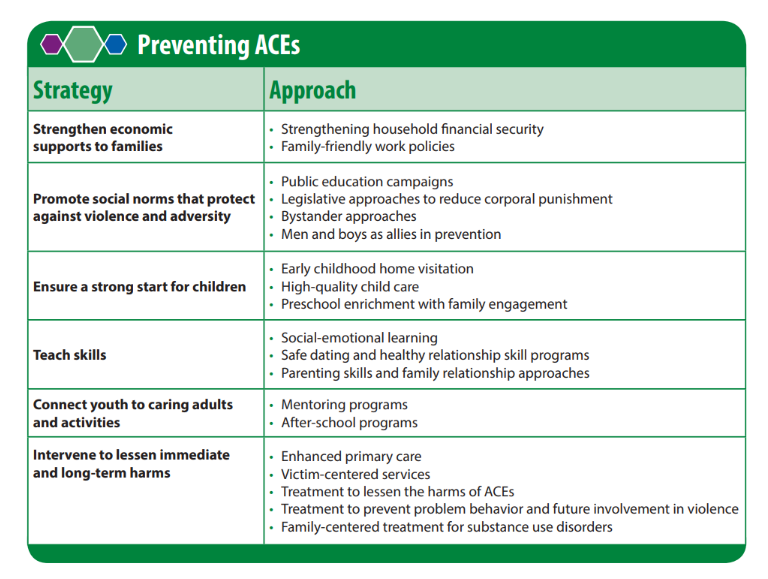
Adverse Childhood Experiences (ACEs) have acquired significant attention in recent years as researchers and experts recognize the long-lasting impact they can have on individuals’ lives. CASA (Court Appointed Special Advocates) Kane County along with many other organizations, is concerned with the long-term and profound effects of ACEs, the challenges they pose, and the importance of understanding and addressing them to promote healthier futures for affected individuals.
Defined by the CDC:
“Adverse Childhood Experiences, or ACEs, are potentially traumatic events that occur in childhood (0-17 years) such as experiencing violence, abuse, or neglect; witnessing violence in the home; and having a family member attempt or die by suicide.
Also included are aspects of the child’s environment that can undermine their sense of safety, stability, and bonding such as growing up in a household with substance misuse, mental health problems, or instability due to parental separation or incarceration of a parent, sibling or other member of the household. Traumatic events in childhood can be emotionally painful or distressing and can have effects that persist for years. Factors such as the nature, frequency and seriousness of the traumatic event, prior history of trauma, and available family and community supports can shape a child’s response to trauma.”
ACEs encompass a broad range of experiences that can profoundly shape a child’s development. These experiences can disrupt the formation of healthy relationships, impede cognitive and emotional development, and increase the risk of various physical and mental health issues later in life. The impact of ACEs extends far beyond childhood, potentially influencing adult behaviors, relationships, and overall well-being.
According to The National Child Traumatic Stress Network:
“Children who suffer from child traumatic stress are those who have been exposed to one or more traumas over the course of their lives and develop reactions that persist and affect their daily lives after the events have ended. Traumatic reactions can include a variety of responses, such as intense and ongoing emotional upset, depressive symptoms or anxiety, behavioral changes, difficulties with self-regulation, problems relating to others or forming attachments, regression or loss of previously acquired skills, attention and academic difficulties, nightmares, difficulty sleeping and eating, and physical symptoms, such as aches and pains. Older children may use drugs or alcohol, behave in risky ways, or engage in unhealthy sexual activity.
Children who suffer from traumatic stress often have these types of symptoms when reminded in some way of the traumatic event. At no age are children immune to the effects of traumatic experiences. Even infants and toddlers can experience traumatic stress. The way that traumatic stress manifests will vary from child to child and will depend on the child’s age and developmental level.”
Addressing ACEs requires a multi-faceted approach that focuses on prevention, intervention, and support. Creating safe and nurturing environments for children is crucial to prevent ACEs from occurring in the first place. This involves promoting positive parenting practices, supporting families in need, and ensuring access to quality education and healthcare services. Collaborative efforts between healthcare professionals, educators, social workers, and communities are necessary to create comprehensive support systems for those affected by ACEs.
The CDC has advised that implementing the strategies listed below as an approach to prevent ACEs:
Strengthening economic supports for families
Promoting social norms that protect against violence and adversity
Ensuring a strong start for children and paving the way for them to reach their full potential
Teaching skills to help parents and youth handle stress, manage emotions, and tackle everyday challenges
Connecting youth to caring adults and activities
Intervening to lessen immediate and long-term harms
Raising awareness about ACEs is crucial in generating empathy and understanding among society. By educating communities, policymakers, and healthcare providers about the prevalence and impact of ACEs, we can create a culture that prioritizes prevention and intervention. Increased knowledge can lead to improved strategies and resources for addressing ACEs, ultimately breaking the cycle and promoting healthier futures for individuals affected by childhood trauma.
Adverse Childhood Experiences can have far-reaching consequences that not only affect the physical, mental, and emotional well-being of individuals throughout their lives but the community as a whole. Recognizing the impact of ACEs and implementing preventive measures, resources, early interventions, and supportive systems is essential in breaking the cycle and promoting resilience. CASA Kane County is data-proven to support children with ACEs by providing one caring adult in the child’s life.
By fostering awareness and understanding, we can work collectively to create a brighter and more compassionate future for those who have endured adverse childhood experiences.
Will you help a foster child overcome adverse childhood experiences?
CASA Kane County is currently seeking VOLUNTEERS!

